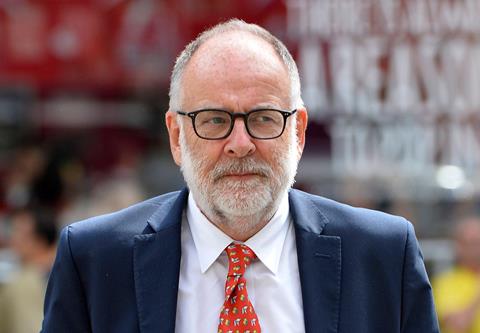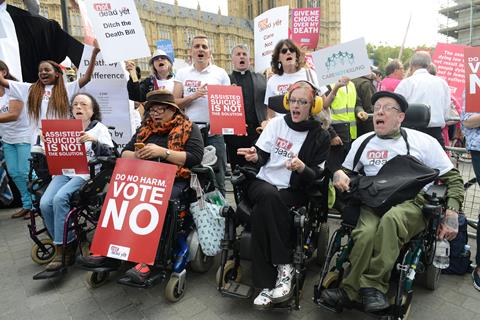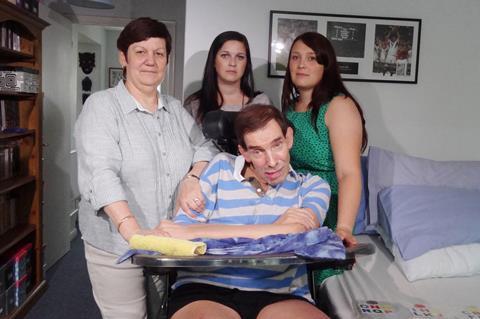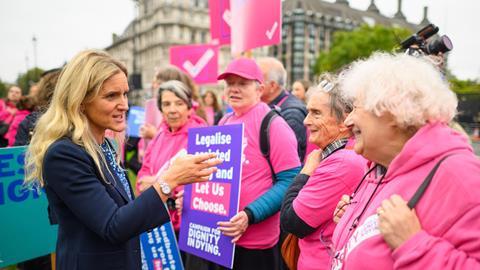A private member’s bill introduced by Kim Leadbeater MP represents the strongest chance yet that assisted dying could be made legal in England and Wales. Do its safeguards answer the critics? Eduardo Reyes reports
The comedy singing group Fascinating Aida include knife-edge humour and subjects in their songs. One from the 1990s imagines a daughter trying to convince her mother to go to Switzerland’s Dignitas Clinic to end her life. ‘Your health is appalling,’ the daughter sings, ‘it’s time that we bade this existence adieu. So no more debating… why are we waiting? Your will just needs dating. Sign here…’
The group could be criticised for bad taste, though that is also rather their USP. But the lyrics reference a deep-seated fear evident in debates on assisted dying, the service which the famous Swiss clinic provides. That is the widely expressed belief that where legislation is passed which allows assisted deaths, there is an attendant risk that vulnerable people can be pressurised or coerced into choosing a premature death for reasons of the convenience or financial gain of others.
A further fear is that even without such pressure, some may choose this option because they do not want to be a burden on loved ones, or simply because palliative care – an admittedly overstretched range of services – will prove inadequate in their final months.
Supporters of a change in the law therefore need to answer the odd-sounding question: is there a safe way to permit assisted deaths?
Assisting a suicide
Until the early 1960s, suicide was a criminal offence. The 1961 Suicide Act which ended that was one of many pieces of legislation over the 1960s and 1970s that took the law out of the long shadow of Victorian morality. But that act put in place a safeguard against misuse of the new legislation, introducing a new offence – assisting a suicide. Assisting a suicide became a criminal offence punishable by up to 14 years in prison. And because the law prevents profiting from such assistance (forfeiture), someone convicted of assisting could not inherit.
Meanwhile, other jurisdictions have legislated to allow assisted dying, including US states, Switzerland, Canada and Australia. The possibility of travelling to die has also coincided with advances in medical treatment, with the perhaps perverse result that more of us live for longer with terminal conditions. The interest in, and opportunity for, an assisted death has risen. More than 540 Britons have now died at Dignitas, resulting in 187 referrals to the Crown Prosecution Service of people who have travelled with them to their deaths, thereby ‘assisting’. There have been four successful prosecutions.
Parliament has considered this issue before. But with the intake of new MPs in 2024 and a change of government, campaigners who want to see change have their best chance yet. Spen Valley’s Labour MP Kim Leadbeater finished top of the latest private member’s bill ballot and has chosen to sponsor a bill on assisted dying. Crucially, the government has said it will give the bill adequate time to be passed as law, if that is parliament’s will.
Leadbeater’s Terminally Ill Adults (End of Life) Bill, published this week, will have its first debate and vote on 29 November. It would make it legal for over-18s who are terminally ill to be given assistance to end their own life.
As currently drafted, the assisted death option would be open to someone who:
- has been a resident of England and Wales and registered with a GP for at least 12 months;
- has the mental capacity to make the choice and be deemed to have expressed a clear, settled and informed wish, free from coercion or pressure; and
- is expected to die within six months.
They must make two separate declarations, witnessed and signed, about their wish to die. Two independent doctors must be satisfied the person is eligible and there must be at least seven days between the doctors’ assessments. A High Court judge must hear from at least one of the doctors and can also question the dying person, or anyone else they consider appropriate. There must be a further 14-day ‘period of reflection’ after the judge has made the ruling before a legal assisted death can take place.
Alex Goodman KC told a Landmark Chambers seminar on Tuesday, the day after the bill was published: ‘There are eight times you need to make or reaffirm a decision in formal ways. Very formally, you have to go through this. There are five formal points for professionals.’ This means, he reflected, that ‘in reality the process is two-to-three-months’ long’.
The right bill?
Charlie Falconer, a Labour peer and former lord chancellor, is a long-time supporter of assisted dying. In 2014 he introduced an Assisted Dying Bill in the Lords. It passed its second reading but had its progress cut short by the 2015 general election.
Falconer (pictured below) tells the Gazette that while Leadbeater’s bill includes enhanced safeguards compared to his 2014 bill, she has not taken any group of people out of scope to achieve a higher standard of safety. ‘The ambit of both bills is the same,’ he says.
'I don’t think this legislation is similar to any other. It stands on its own. It looks to other countries. It probably has the most safeguards of any'
Lord Falconer

The question arises, what is the new bill ‘like’? Lawyers have compared the possibility of legislation to that which legalised abortion. The Abortion Act 1967 provides that, if the procedures set out in that act are followed, no crime is committed. Previous cases, such as Purdy (2009) and Nicklinson, which failed at the Supreme Court in 2014, while also developing the law, relied on arguments under the Human Rights Act 1998.
And then there is Canada’s record on assisted dying. It has proved controversial. In particular, its test of ‘unbearable suffering’ has allowed an assisted death to be provided to more than 460 people with chronic mental health conditions. So the legal genesis and character of the Leadbeater bill matters.
‘I don’t think this legislation is similar to any other. It stands on its own,’ Falconer answers. ‘It looks to other countries. It probably has the most safeguards of any. It is consistent with human rights, but it isn’t using human rights.’
The bill’s principles, he argues, are close to Oregon’s legislation. He points out that Canada’s legislation has its roots in a Supreme Court ruling, from which the principle of ‘unbearable suffering’ is drawn, and which further court cases that shaped the law’s application relied on.
Prominent among the opponents of assisted dying legislation are disability rights campaigners. Falconer points out that disability and mental health are explicitly excluded from the scope of the Leadbeater bill, which states: ‘For the avoidance of doubt, a person is not to be considered to be terminally ill by reason only of the person having one or both of – (a) a mental disorder, within the meaning of the Mental Health Act 1983; (b) a disability, within the meaning of section 6 of the Equality Act 2010.’

Doctors
Among the safeguards in the Leadbeater bill are the criminal sanctions set out for coercing or pressurising a person to seek an assisted death, or for destroying documents – offences that, depending on the category, can attract a custodial sentence of up to 14 years or life.
Together with an assessment of mental capacity, a process that satisfies concerns about coercion is hugely important in the context of an officially sanctioned assisted death. On a par with those assessments is the medical judgement that the person applying to the court for an assisted death ‘can be reasonably expected’ to die from their terminal disease within six months.
That time estimate, former Supreme Court judge Lord Mance told the Landmark Chambers seminar, is ‘quite a flexible text’. He posed the question: if the assessment of life expectancy is ‘three-to-seven, three-to-nine, or three-to-12 months, which would suffice?’.
There are other questions about the role of doctors. The court will rely on the two doctors to confirm the eligibility of a person for an assisted death. However, not all their assessments are medical. David Lock KC, who spent a decade on the BMA’s ethics committee, told the seminar: ‘Doctors aren’t investigators.’
On the issues of pressure and coercion, a model he would draw more reassurance from is that used by the Human Tissue Authority (he is an HTA board member). The HTA’s process must establish consent: for example, someone donating a kidney does so freely and has not been pressurised or financially incentivised to do so.
The HTA accredits individual assessors. These evaluate whether consent is given ‘freely, and without pressure and reward’. There is an interview process.
Lock is also a deputy High Court judge of the Family Division. ‘I worry about the capacity issue for the courts,’ he says. ‘If this is a purely paper-based exercise, how does a judge satisfy themselves [what] the paper reflects?’
Using a judge for oversight is just one option, Landmark’s Fiona Scolding KC points out: ‘In most other jurisdictions [with assisted dying laws], there is no judicial oversight. There is a body. In Australia, it includes doctors, lawyers, people with disabilities… Would it not be better to have a multidisciplinary body, to get buy-in from the rest of society?’.
This is a new role for doctors, Lock observes, and will require training. ‘We may be expecting them to pay for their own relevant training,’ he points out. Also in a financial vein, he asks of the process: ‘Is this not on the NHS?’ and as ‘it involves applying to the High Court – is it just for the wealthy?’.
The Leadbeater bill includes a ‘conscience clause’. Assisted-death-related work is not something a doctor must do. This, though, raises a practical question, Scolding points out – while half of BMA members support assisted dying, that support level ‘falls for geriatricians’.
Among the bill’s fiercest critics are palliative care doctors. There is no doubt that the provision of palliative care requires improvement and has been hit by funding cuts. Health secretary Wes Streeting is among the MPs who have said they cannot support assisted dying legislation until palliative care has demonstrably improved.
Palliative care does not just relate to physician-supervised pain relief. It is multidisciplinary and the team may include nurses, physiotherapists, carers and counsellors. There is no way to guarantee that the lack of any part of an effective palliative care package would not influence a person’s decision to seek an assisted death.
However, Scolding, whose sector expertise is health, has reviewed all jurisdictions that permit assisted dying. ‘Palliative care improved in some jurisdictions,’ she notes. ‘In some ways, it pulls palliative care higher up the agenda. It may provide impetus to improve palliative care more generally.’
Falconer ‘strongly’ supports improvements in palliative care, but argues it is wrong to link the passage of assisted dying legislation to its provision. Arguing against prominent palliative care doctors, he says: ‘The law is broken and needs to be dealt with. It shouldn’t be linked to the provision of perfect palliative care.’
Wider context
The emotive charge of discussions on the medical process of death, and the prospect of criminal investigation of bereaved relatives, claims the lion’s share of the debate around assisted dying. But there are other important considerations when deciding whether the proposed legislation as drafted is ‘good’.
Alexa Payet, a private client partner at Michelmores, points out: ‘Currently, families of loved ones who die by assisted suicide risk losing everything. The forfeiture rule means that they may not be able to inherit anything from their loved one’s estate, including shares in jointly owned property, pensions, and life insurance policies.’
The financial implications of assisted dying are complex, she adds, and the application of the forfeiture rule in such cases ‘is often misunderstood, even among experienced legal professionals.
‘As things stands, the default position is that these families are required to apply to the court for relief from the forfeiture rule. This is a costly process which requires them to relive the trauma of losing a loved one in extremely painful circumstances.’
In Payet’s assessment, the bill ‘will help some families – but many will still be left in a very vulnerable position financially if they assist’. The scope of the bill is narrow, she observes, limiting assisted dying to people who are terminally ill.
‘This would exclude a large number of people, such as those with incurable but debilitating conditions, who may face unbearable suffering,’ she notes. ‘Most individuals who seek an assisted death fall into this category and so the impact of the proposed bill is likely to be limited. Those individuals and their families will be very disappointed that the financial implications were not addressed in the bill’s drafting.’
Courts
Of course, palliative care is not the only underfunded public service it will rely on. There are also the courts.
Melinda Giles, managing partner and head of private client at Giles Wilson, tells the Gazette: ‘Given the complex framework around mental capacity, and the backlog of cases waiting to be heard where there is a dispute over mental capacity, or at the very least vulnerability often involving financial abuse, undue influence in the making of wills or LPAs [lasting powers of attorney], this bill raises many questions on the single point of mental capacity.
‘A person’s capacity can change, from day to day even. It can be affected by medication, shock, fatigue, stress or emotional anxiety. Those with learning disabilities or mental health illness are particularly likely to have a range of capacity; they may understand a simple matter of life and death, but not a range of aspects to the decision. They may be more vulnerable to emotional pressure from those around them. They may be suffering from depression.’
Gurpreet Jani, senior associate at Lewis Denley, says: ‘With the shortcomings of the current system, how can we be sure that capacity checks under the bill will safeguard the terminally ill by ensuring sufficient and consistent capacity checks are conducted in all matters? Sadly, abuse of vulnerable people and the elderly is all too common in today’s society. How can we be sure inappropriate pressure is not being applied?’
Limited scope
What is certainly essential is thorough consideration by parliament, with proper time allowed for deliberation. There are problems with relying on the courts to set out the development in the law here, which would need the ‘right’ case.
Speaking at the Landmark Chambers seminar, Lord Mance, a Supreme Court judge when Nicklinson was considered, noted that the lower courts worked on the basis that given the severity of Nicklinson’s physical condition, he could not administer a lethal dose himself. The ‘machine’ that could achieve this did not exist. By the time the case reached the Supreme Court it was contended that a machine, on his say-so, could. This was ‘not very satisfactory’.
Reviewing the concerns and uncertainties around the proposed legislation, Mance made the practical observation that if someone is going to die very soon, ‘the risk of getting it wrong is less’. It is a point that may give heart to those campaigning for an assisted dying law and who support Leadbeater’s bill.

The support for change of broadcaster and campaigner Dame Esther Rantzen, whose lung cancer is terminal, has undoubtedly increased the likelihood of the bill passing.
However, it should be acknowledged that legal and medical safeguards, and processes included to reassure sceptics and smooth its passage, have a perhaps unavoidable side-effect.
Rantzen’s daughter Rebecca Wilcox, who supports the bill and ‘understands the reasons’ for its extensive and formal requirements, reminded the Landmark Chambers seminar that the process envisaged is ‘bloody lengthy and exhausting’.
‘Having cancer is tiring. Knowing you’re dying is tiring. Trying to convince doctors is tiring,’ she said. What is set out ‘doesn’t reflect how patients and clinicians feel’, she added, noting that she is ‘not sure personal experience has been taken into account’.
An impossible task, perhaps, but maybe we should not be at peace with an impossibility. It does after all represent a failure.
The full Terminally Ill Adults (End of Life) Bill can be read here
































1 Reader's comment